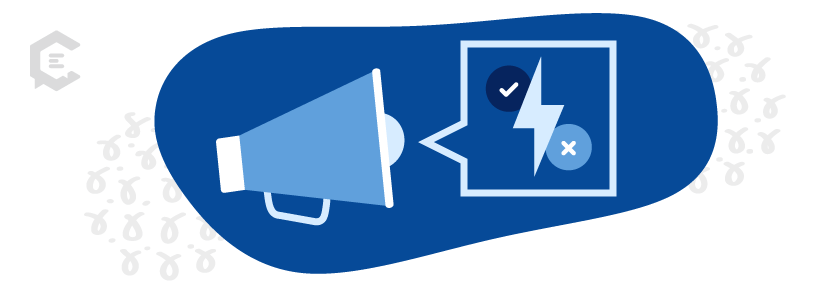Should brands take a stand? With the constant barrage of news and opinions on social media, it can be challenging for brands to know whether — and how — to speak up about controversial topics.
But sometimes the person behind the brand finds it impossible or even immoral to remain neutral about current events.
How can your brand voice an opinion on something controversial without alienating your audience? Here are a few routes you can take and some best practices to consider:

When brands take a stand — 3 ways to handle hot topics
When it comes to acting on your conscience as a business entity, there are three main routes brands typically take.
1. Take action behind the scenes
Some brands focus on taking quiet actions to support the causes they believe in.
For example, Patagonia typically doesn’t take a public stance on environmental issues, but it does donate a percent of sales to environmental organizations. The company also encourages employees to be vocal about their beliefs and gives them time off to participate in protests and other activism.
This approach allows the brand to remain relatively neutral while taking actions that matter.
2. Take on a bold political identity
At the other extreme, some brands embroil themselves in politics and count on drawing business from those who agree with them.
For example, Chaco Sandals famously donated all of its proceeds from one day’s sales to the Standing Rock Sioux Tribe, with the statement: “We stand with Standing Rock.” Chaco’s customers are overwhelmingly liberal and environmentally conscious, so the brand could afford to gamble with a strong stance.
Ben & Jerry’s ice cream, Penzey’s Spices, and My Pillow have all established strong political identities. Their positions have won both fans and detractors, but the brands remain committed to their values. They are willing to lose customers who disagree and count on building strong bonds with those who share their views.
3. Opt for the middle route
When brands take a stand, it’s sometimes only when issues are heating up due to social media hashtags. Many companies that don’t usually take a political stand have made statements during the upheavals surrounding Black Lives Matter, school shootings, or mask mandates.
Nike, for instance, released an ad that said, “For Once Don’t Do It” as part of a campaign to combat racism in the wake of George Floyd’s death. The ad was incendiary and drew both support and criticism, but Nike is a well-established brand with strong ties to its customers, who applauded the move.
In another example, Levi’s took out full-page ads in the New York Times and Wall Street Journal to call for gun control measures.
9 best practices for dealing with hot topics
Whatever path you choose as a brand, there are some best practices for engaging with hot topics.
1. Don’t engage in comment arguments
When brands take a stand on social media or blogs, the comments section is likely to heat up. It’s best to avoid engaging with comments that are inflammatory or trollish.
Also, feel free to delete spammy or abusive comments (after reporting them if necessary).
2. Attack issues, not people
When you’re taking a stand on something controversial, it’s important to focus your anger and outrage on the issue rather than specific people or groups of people. Don’t call out individuals by name and avoid ad hominem attacks.
3. Talk about what you stand for, not what you stand against
This is a subtle point, but important. When brands take a stand, your position should be positive and empowering rather than negative or reactive.
Instead of emphasizing the issue or problem, describe a better future.
4. Personalize your views
Don’t hide behind a faceless corporate entity. It’s good for people to know that you are a real human being with feelings and opinions about what’s happening in the world. If you have a personal connection to an issue — like in the case of a minority-owned business — don’t be afraid to share your story.
This will help build trust and loyalty between your customers and your brand.
5. Remain calm and use neutral, professional language
It’s essential to remain calm when you speak about controversial topics and use neutral language rather than inflammatory or accusatory language.
When people get riled up and start name-calling or exaggerating, they tend to be less credible in the eyes of others.
6. Be fair, even if you can’t remain neutral
When brands take a stand on a major issue, it’s crucial to be fair and consider all sides of the debate.
Even if your brand ultimately comes down on one side, try to articulate the other side’s argument convincingly and without scorn. This will help maintain trust and credibility with people who disagree with your views.
7. Don’t speak as your brand in anger
If you’re angry about something, take some time to cool down. Trying to respond while you’re in the heat of the moment will only make matters worse.
Give yourself some time and space to think about how your brand could professionally address the situation before taking any action.
8. Seek first to understand, then to be understood
Before you speak, make an effort to understand the other side’s argument and why they hold those views. Only then will you be able to effectively communicate your own position in a way that others will find convincing.
9. Decide in advance how you will handle any media attacks
When brands take a stand on an issue, it’s important to know that it could attract press attention.
Will your brand respond with silence, or will someone speak for the company? If so, who? Will they have the authority to decide how the company will respond? Preparation is key here.
Take a stand wisely
Brands are made up of people who are capable of strong feelings. Sometimes, the people behind the brands feel compelled to take a stand on current events.
How you voice your opinion is essential. Remember: Stay calm and use neutral language; be fair and understanding of all sides; and remain professional.
If you can be fair and balanced and avoid being drawn into arguments, you can state your views with minimal damage to your brand — and maybe even create a few new fans along the way.
Considering taking a stand in your content? Talk to a content specialist at ClearVoice today about getting content developed for your brand. From blog posts on controversial topics to professionally crafted mission and vision statements, our expert team of writers can handle it all.





